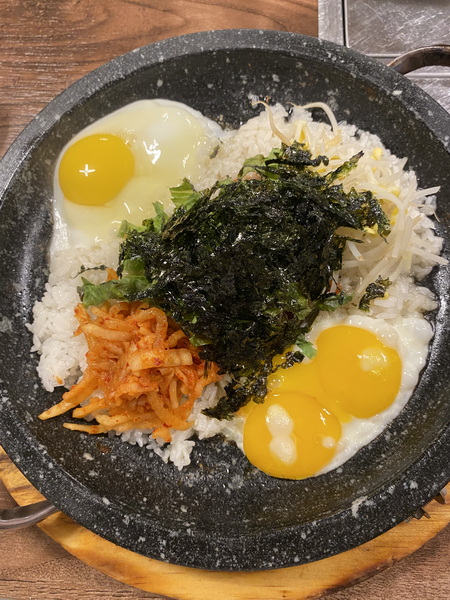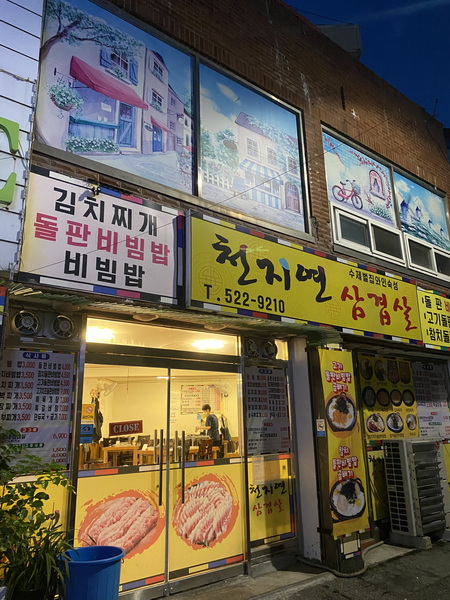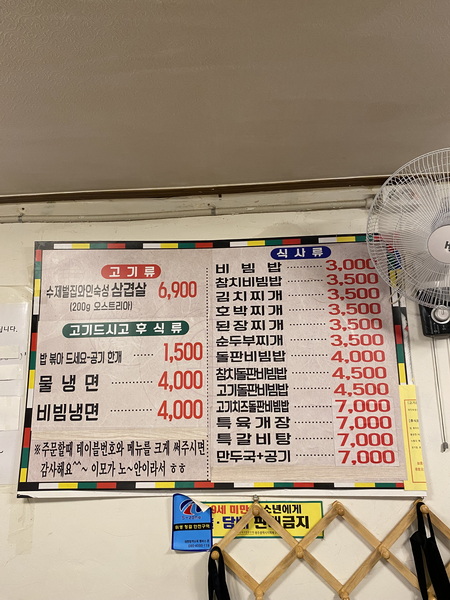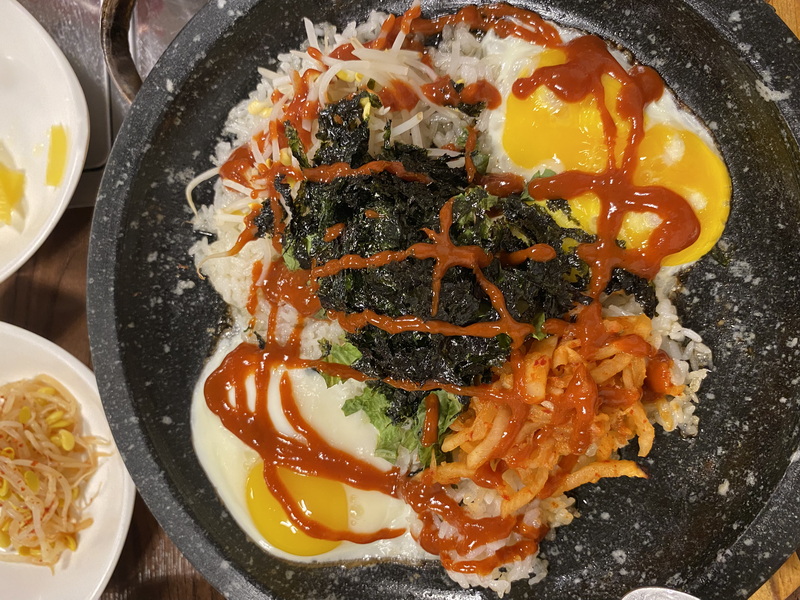Delightful, Delectable Local Cuisine: Customer-Friendly and Budget-Friendly Eatery
By Yousra Feriel Drioua
“In the heart of the CNU Gwangju campus…” It’d be pretty alluring to Chonnam National University students if this piece of writing were to start with such a line. But that’s not the case. At least, not in the exact geographical terms. But that’s not to say it’s far from the facts. The place I’m about to introduce to you to is very close to the perimeter of the Chonnam National University campus in Gwangju. It’s well-known among local Korean students and foreigners as well. Considered a “cheap eats” and an “authentic local cuisine” spot, one thing for sure is that it’s a must-try for anyone visiting the area, student or not.

Our “story” revolves around the CheonJiYeon Grilled Pork Belly restaurant. It’s kind of ironic if I do say so myself, as I am a Muslim, and… we don’t eat pork. However, as the curious cat I tend to be, when I initially discovered places after arriving in Gwangju, I landed on this restaurant’s doorsteps. The restaurant is more commonly known among the foreign student commuunity as the “dolpan bibim [돌판비빔, hot-stone mixed rice,] place.” To be clearer, dol [돌] is “rock” and pan [판] is a square-shaped plate. The restaurant is located not too far from the CNU Jilli Hall. It’s very easy to spot. It is known as a campus-friendly, budget-friendly, flavorful, and hospitable spot – all helping it preserve its reputation.
To be frank, the aesthetics of the place, both indoors and outdoors, aren’t much to the average eye – similar to most local and authentic establishments. You are privileged to discover its charming points once you give the place a chance. And if by luck you are with a sentimental soul, you’ll truly bask in the melancholy and bittersweetness of its walls. Reminiscing the stories of hundreds of students who’ve been in your seat before you: where they could be, what kind of days they were having at their time, and how fleeting youth and time are.
Yet, getting back to our topic. Once you set foot inside the restaurant, you’re met with a bright smile and the most cheerful welcoming from the owner: a Korean lady with short black hair. She will usually let you choose your seat unless you’re somewhat like me: quite indecisive. Then she’ll have you seated herself. Whether you’re enjoying a lone meal or rushing in with a group of friends, the place offers a variety of seats to keep you comfortable as you enjoy your meal. With a classic BBQ stove in the center of each table.

The menu is simple, quite objective, and cuts to the chase. So, when you’re heading to this place, you know you’re specifically craving for something. The prices range from a 3,000-won bibimbap [비빔밥, mixed Korean rice,] as the cheapest option to 7,000-won options as the most pricey ones. Considering the variables and logistics, that’s not a deal you’ll come by every day. Nevertheless, the place is most famous for its signature dish the “dolpan bibimbap.” The most standard and meatless version is 4,000 won. Naturally, the price goes up depending on what other toppings you request. So, whether you’re vegetarian or not, you’ll manage to get yourself a taste. I’d even hazard say “vegan” if you ask to hold the eggs and don’t mind dining at an establishment that handles animal produce.
The dish in the photo is the original dolpan bibimbap with tuna added and accompanied by the classic Korean assortment of side dishes. It might seem like a small portion at first glance, but it is for one person only, and the main dish is quite filling. As sides, you’re served pickled yellow radish, kimchi, beansprouts, and pork (not pictured), in addition to an oddly refreshing and sweet, warm soy-paste bowl of soup. Speaking of side dishes, I sincerely appreciate the lady for being able to remember that I do not eat pork and not serve it to me, as I tend to be pescatarian in non-halal establishments. Very subjectively, that’s one of the most endearing aspects of this eatery. Because it’s frequently visited by international students, the owner has a knack for such dietary restrictions and excellent facial recognition skills. Making sure everyone feels welcomed and comfortable. Call it a sense for good business practices, but I choose to go for the sentiments. How could I not, when she gives free tangerines in winter and candy throughout the seasons?

To wrap this up, let’s talk real “food business.” Aka flavor. Do you see the black stone beneath all that goodness? It’s the actual dolpan. That’s where all the hype comes from. The black stone plate arrives sizzling on your table with a gentle warning from the owner not to touch it. You may let your food get a little sun-kissed burnt from the bottom before drizzling it with the sublime restaurant signature gochujang sauce and mixing the whole thing. Or the other way to go about it is to mix everything, flatten it, and let it fry in the leftover heat from the stone. The first bite is very much authentic Korean cuisine in one spoon – a little sweet, a little sour, and a little salty. You get crispy bits from the charring of the stone and tender mouthfuls of what didn’t get to touch the pan. Subtle hints of the flavor of everything but never too much of anything. Does that make sense? Let’s call it a campus-friendly, local Korean culinary symphony of tastes.
Hopefully, this piece of writing will serve as the written trailer for the establishment, and will leave you intrigued enough to visit whether you are interested in the décor of the place or are merely trying to save up on cash. Whether you’re simply looking for diverse local food experiences to make the most of your journey in Gwangju or are a student searching for meaning in every nook and cranny of the CNU area, like myself, this place has got you covered with taste, atmosphere, and price.
CHEONJIYEON GRILLED PORK BELLY
천지연삼겹살
Address: Seoljuk-ro 214 beon-gil 90, Buk-gu, Gwangju (Chonnam National University back gate
area) 광주 북구 설죽로214번길 90
Phone: 062-522-9210
The Author
Yousra Feriel Drioua is a KGSP 21 scholar from Algeria, and previously a CNU Korean language trainee and currently a mass communication and journalism graduate school student at Kangwon National University. She seeks to learn and gain various experiences all around. She loves coffee, driving, deep conversations
with friends and writing. Instagram @myyilgi







